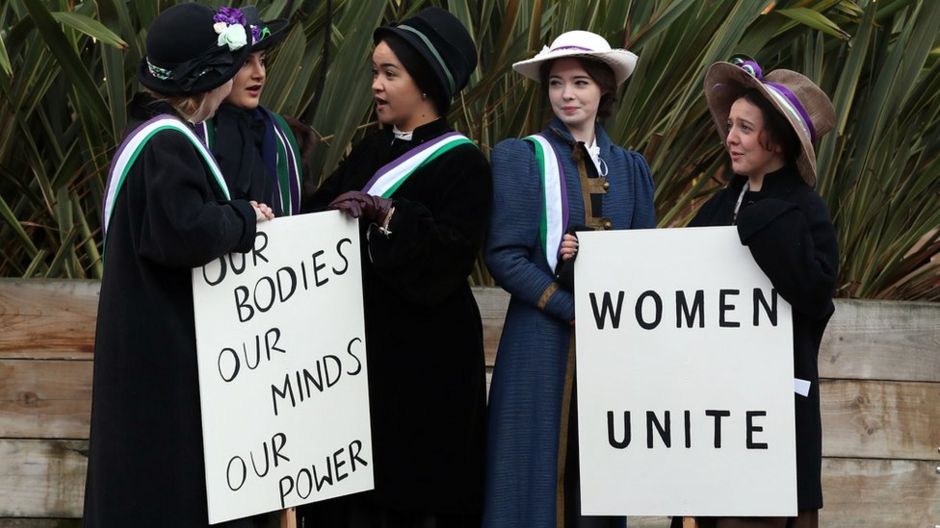A version of this article is available that adapts to what we know about you
Women's vote: Pardoning suffragettes 'complicated'

Students marking the anniversary by recreating a suffragette protest march
Giving pardons to women who were jailed while fighting for the right to vote would be "complicated", Home Secretary Amber Rudd has said.
But she said she would "take a look", 100 years on from some women getting the vote in the UK.
Jeremy Corbyn said a Labour government would apologise to suffragettes and have criminal records overturned.
Helen Pankhurst, great-granddaughter of suffragette Emmeline Pankhurst, said the women had been pardoned by society.
Equality campaign group the Fawcett Society and some relatives of the suffragettes are among those who called on the home secretary to overturn the convictions of women who were imprisoned while fighting for the vote.
But Helen Pankhurst said the suffragettes would be urging women to "continue the fight" rather than "dwell" on their personal sacrifice.
"It was not them breaking the laws that were the problem, it was the laws that were constraining our democracy," she told BBC Radio 5live.
The Representation of the People Act was passed on 6 February 1918 and gave women aged over 30 and "of property" the right to vote.
Theresa May is making a speech in Manchester to mark the centenary of women's votes, hailing the "heroism" of the suffragettes.
Legislation review
The prime minister also used her speech in Manchester to criticise online abuse and intimidation of political candidates and representatives - often women, gay people and members of ethnic minorities.
"In the face of what is a threat to our democracy, I believe that all of us - individuals, governments, and media old and new - must accept our responsibility to help sustain a genuinely pluralist public debate for the future," she said.
Mrs May announced plans for a Law Commission review of legislation to ensure that illegal actions are also illegal online.
Other ways in which the anniversary is being marked include:
- A public exhibition of life-sized images of the central figures of the suffrage movement in London's Trafalgar Square
- Portraits of these people will also be in an exhibition at London's City Hall
- A reception for female MPs past and present in Parliament, hosted by Mrs May
- The Parliamentary Archives will display the 1918 Representation of the People Act itself for the first time
- BBC Radio 4's Today Programme used only women contributors and an all-female presenter line-up on its show
Records compiled by the England, Suffragettes Arrested, 1906-1914 collection indicate there were more than 1,300 suffragette arrests and many women were jailed.
Emmeline Pankhurst, a founder member of the Woman's Social and Political Union, and leading suffragettes Emily Davison and Flora Drummond were among them.
Ms Davison was found guilty of placing a "dangerous substance likely to injure" in a post office letter box outside Parliament and sentenced to six months in Holloway Prison.
Mr Corbyn said the convictions were "politically motivated and bore no relation to the acts committed".